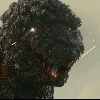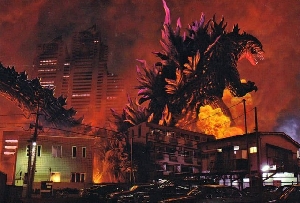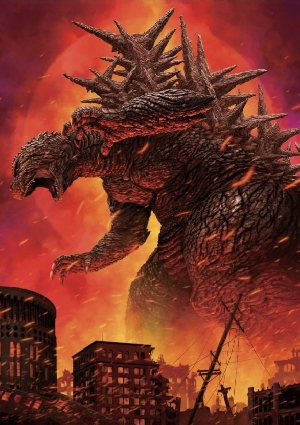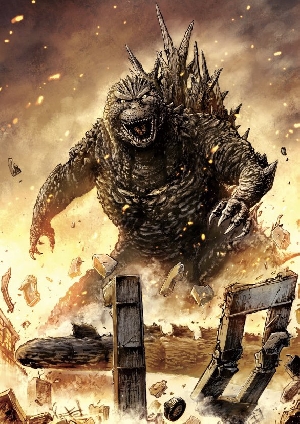What defines a Godzilla movie?
Godzilla Forum Topic

MilqueChocolate
MemberBaragonJuly 04, 20156552 Views32 RepliesI would like to ask all you fans a question that i would like you to answer in the best details you can. My mother and I were arguing about my Godzilla animation, I told her that I would add human death and plenty of monster battles and destruction. She told me thats not what makes a godzilla movie. To me, a Godzilla movie is something with human story but doesnt over-exaggerate it. Its a movie that has human death, but not too much. Its a movie with plenty of destruction and Kaiju battling. Now here is a question for all you G-Fans here, what do You think makes a Godzilla movie, a godzilla movie. Like I said, please answer with the best details you have. I will read every single one of them. Thank you for reading!
Other discussions started by MilqueChocolate
Replies to What defines a Godzilla movie?
HUGE-BEN - I personally felt that Godzilla's eyes in GMK were neat! I enjoyed how monstrous he appeared - it suited his character as it was presented within the bounds of the film! :)
As overrated as it may be, I find Gmk the best of the millennium series. Godzilla is and always will be a symbolism of the atomic bomb. He wasn't made to be kid friendly during his early years. He was our punishment, our sacrilege, our torment, our demise. He didn't come kid friendly until the late 60's and 70's films. Due to Gameras influence.
If Godzilla wasn't meant to be scary, terror incarnate, or our punishment, then what would He have been?
http://hugeben.deviantart.com/ check out my gallery of Godzilla artwork! Follow me on Twitter@thebigbadben90.
Everything mentioned so far is fascinating and really thought provoking. Forgive me if my answer sounds too simplistic, but take a look at Tri-Stars Godzilla 1998 and the opposite of that defines a Godzilla film. Specifically, Godzilla is not a coward that runs from the military and is impervious to missiles. He's not an overgrown iguana on the loose. And this might sound debatable if you watch the films closely, but most of the destruction in Godzilla movies is caused by Godzilla himself or adversary monsters and not the military. I say debatable because I've seen some Toho films where it seems like the military is firing at the monsters but it looks more like a spray of gunfire going past them or over them.
GorrillaGodzilla,
The only malicious intent Godzilla had in Godzilla 2000 was destroying human energy. This is established during his first attack in the film. It was aggression most certainly, but malicious? The most obvious reason seems territorial.
As for GMK, there was nothing about how Godzilla acted that wasn't established by what the characters were fearing or saying before he arrived in the film. It was completely in line with what the movie doing and felt no more or less out-of-place than what Godzilla does in other movies. My only recommendation for coping with Godzilla's mercilessness is paying closer attention to the first 30-40 minutes of the film.
I'll agree Godzilla does act different from previous incarnations and that's both an excellent and forgotten thing-- Praiseworthy even. In the early Showa era Godzilla would act completely different from film to film. In King Kong vs. Godzilla he would clap, tauntingly, when he had the upper hand. In the following film he was an unstoppable force with little character to him at all. In Ghidorah: The Three Headed Monster he's suddenly a reluctant hero taking cheap jabs from a laughing Rodan and communicating with different monster species, etc. We might as well curse these decisions for Godzilla "never acting like that" as well. We're only 50-45 years too late.
The point is younger fans are used to a set way that Godzilla is portrayed. Despite storylines that might place him in a more sympathetic light, Godzilla's character has remained relatively unchanged since the 1980s. Barring minor variation, GMK's Godzilla is the most unique character change to him since the 1960s-- And even that is only an extention of things we've seen before, not a revolution.
GMK has issues and if you dislike it, that's fine. But claiming it was "poorly executed" isn't targeting the right flaws since its execution is arguably more auteur-driven than anything the series has seen since 1989. Maybe longer.
Being Auteur doesnt necessarily mean good though. I would say Godzilla vs Hedorah is extremely auteur, but think it is the worst film in the series.
I don't find GMK Godzilla's actions all that different that others. It's more aggressive towards humanity, but not that much more than early heisei, or showa, nothing that made me really gasp. I wouldn't call Godzilla's actions the problem with the film, it was everything around them that was the problem, it was nice seeing an evil Godzilla with no redeemable values destroying things for no reason other than to destroy. The fact he's a representation of simply forgetting the past is pretty poorly done though, in my opinion, a bad motive to this destruction and overall character.
"The fact he's a representation of simply forgetting the past is pretty poorly done though, in my opinion, a bad motive to this destruction and overall character."
In what way though. Not once has anyone who doesn't like the film given a decent reason as to how it's poorly done and, even worse, this is the absolute first time I've witnessed anyone insist it's a "bad motive", even if they don't like the film. Especially considering the Japanese climate at the time-- Or now for that matter.
While I agree autuerism isn't always good, GMK is certainly an exception, especially in comparison to the previous dull 15 years.
G-Man
I have been in the watching Godzilla since 1994, i wouldn't call myself a newbie fan.
I do happen to agree with Durp, as he makes some great points. And i am not saying that Godzilla acting differently never happened, i'm just saying that in the original's Godzilla vs King Kong, Three Headed Monster etc. His execution of character difference was explained in a greater detail.
In GMK, they gave some forced reason that, "The souls of world war 2 veterans have come back with a vengeance!!" And that did not make any sense too me. If it was Japanese world war 2 veterans why would they mercilessly kill they're own people? Wouldn't it have been the Allies that might have seeked that kind of vengeance?
And his white eyes i know i have elaborated before, were just so damn cartoony for even me. The film felt like they were trying to emulate 54, but the screenplay and the script just did not work.
Good grief.
In what way though. Not once has anyone who doesn't like the film given a decent reason as to how it's poorly done
Well they establish Godzilla is supernatural. This isn't left ambiguous like the original if he may have been the island's monster this movies establishes this Godzilla is supernatural, but at no point does he ever do anything supernatural it's just Godzilla with white eyes. Maybe a super pissed off Godzilla but nothing is different that the normal monster to this possessed one. The monster is also animal which is also established in the movie, so which way are we going? He acts normal outside the white eyes so I guess he's an animal but other characters disagree. This is thrown back and forth to the point no one knows what he is. You often blame the fact on the confusion of heisei's timeline on the writing but there's just as much confusion over what this Godzilla really is. I've seen so many different things people assume he is based off the movie.
I've witnessed anyone insist it's a "bad motive", even if they don't like the film.
Okay I think it's fair to say based off the film the angry Godzilla was going to destroy Japan killing as many people as possible on the grounds of trying to forget the past. Problem is this movie takes place in 2001 so most of the people weren't even alive for this event and even those that were might have been too young to actively participate or do that horrible things japan did in the war. The movie even acknowledges the fact Japan did horrible things. There's nothing wrong with trying to distance yourself as a new generation from the sins of your fathers. They weren't alive, had no influence on the time and probably don't support the things Japan did so they try to forget, a common thing people do with horrible things. Every country does it the bad part of their past gets shoved under the rug by the new generation trying to establish themselves as different people with a different mindset and ethics. Problem is this doesn't matter Godzilla is going to kill all of them on the grounds of for a better term trying to move on. If this movie took place in the 60s or 70s and people were lying to the public about what happened in the war or denying it I could see the vengeance, but on the grounds of trying to forget the horrible things your country did, possibly long before you were born, you get to die.
GorillaGodzilla,
"His execution of character difference was explained in a greater detail."
No it wasn't. There was literally zero explaination as to why Godzilla clapped his hands and gloated in King Kong vs. Godzilla. There might have been some translation with the monster talk in Ghidorah: The Three Headed Monster, but even the talk itself is never explained and is a trait that has never happened before. Furthermore, no one explained why Godzilla joined up with Mothra to stop King Ghidorah-- It's merely and effectively shown.
Meanwhile, the entire first 30 to 40 minutes of GMK practically set up what kind of Godzilla we're about to get both in verbal exposition and visuals.
"And that did not make any sense too me. If it was Japanese world war 2 veterans why would they mercilessly kill they're own people?"
Well, you basically explained why it doesn't make sense to you-- You weren't paying attention. It's not simply the Japanese war veterans that have given their rage to Godzilla, but all of those who lost their lives in the Pacific War. This is clearly stated during the conversation with Prof. Isayama at the police station. Americans, Chinese and Russians lost their lives in the Pacific War as well.
Furthermore, as the film eludes to early on, the restless souls are enraged by the forgetfulness of the Japanese people. This gets into the current social climate of Japan; they're a country that likes to gloss over WWII in the history books. This is seen as dangerous in the eyes of many professors and historians as many believe the Japanese should take responsibility for the things they did in the war. Thus the wrestless souls are more a conglomeration of clashing ideals, all of which feel Japan needs to heed the past. This is effectively symbolized in how the country has forgotten Godzilla himself or likes back at him as a joke.
Wouldn't it have been the Allies that might have seeked that kind of vengeance?
As I said above, the Allies were also in the Pacific War and have also bestowed their rage to Godzilla. But where does this idea of vengeance come from? Why would the Allies want vengeance? They won. The remnants of the Allied forces today merely want Japan to remember the war and take responsibility. That's the point here. Godzilla's terror is a punch in the face to keep the country from repeating the same mistakes. (Mistakes that many believe Japan may make again today, I might add.)
The film felt like they were trying to emulate 54, but the screenplay and the script just did not work.
There lies another problem. The film isn't trying to emulate the 1954 movie. It's updating what Godzilla means for the current Japanese generation. It's a story drenched in mysticsm and the modern Japanese political climate. It does its own thing while merely respecting the terror seen in the original. If you go in thinking it's some sort of imitation of 1954, you have the wrong mindset.
Durp,
"Well they establish Godzilla is supernatural."
Where? This is a massive misconception. What he is is clearly stated and emphasized by Prof. Isayama:
"Atomic weapons and energy have given it extraordinary capacities for survival. Yet it's still a physical animal, thus it can be defeated."
The eyes are an aesthetic choice. Kaneko wanted Godzilla to look angry and "evil" and that type of aesthetic typically sells it. Even if no one is sure what Godzilla is in this film, that kind of questioning works. The ambiguity with Godzilla makes him all the more terrifying and if people can't pay attention enough to simply believe he may or may not be a mystical creature, more power to them for adding that layer. I wish it were closer to that complexity, honestly.
"Problem is this movie takes place in 2001 so most of the people weren't even alive for this event and even those that were might have been too young to actively participate or do that horrible things japan did in the war."
It takes place in 2004, additionally this claiming people were "too young to remember" or "participate" is pleading ignorance to the real issue. You and I are too young to have remembered the war, but we have books upon books with pages and pages dedicated to WWII.
In Japan it's not that simple. Those books may or may not exist, but little attention is brought to them either due to some form of shame or an insistance that they need to forget what atrocities they committed and continue to play the victim card without any responsibility. This is the exact problem that many filmmakers, historians and professors are combating in Japan right now and Shusuke Kaneko ended up addressing it years before it became a more popular topic for the likes of Hayao Miyazaki.
To paraphrase Miyazaki, the political and economic climate in Japan is very similar to their pre-WWII intervention, and its a cause for worry.
The idea isn't that they're trying to distance themselves from it, the idea is that they refuse to take responsibility altogether. The characters in the movie, for example, look back at the history of Godzilla as some kind of myth or joke. They don't understand what really happened during Godzilla's first appearence and how serious it was because it's never spoken of.
And so Godzilla is, once again, a warning to that kind of forgetfulness. Is it really that unimportant? I suppose Godzilla killing people so we don't forget about nature's wrath is a better reason? Or how about Godzilla being a warning of the dangers of radioactivity for a culture that's already experienced atomic warfare a mere decade beforehand? Lets not pretend Godzilla hasn't killed people for symbolic reasons that can be framed as superfluous.
It's similar to the idea of certain German groups denying the Holocaust actually happened. There are people who either truley believe that or insist on saying it because they want history to forget about it. Removing what happened doesn't make it better. That's what the film conveys and it's become a more pressing issue in Japan than the ho-hum, sweep-under-the-rug mentality you seem to view it as.
Ishyama also says talks about the souls of the pacific conflict and how they have something to do with the monster. In most cases souls are about as close to supernatural as you can get
"but we have books upon books with pages and pages dedicated to WWII."
Because we won that war and are painted in a good light. Every country has things they don't like to acknowledge. Germany WWII, Russia, essentially everything Stalin did, China, dear god China too much to mention, US unfair treatment of african americans prior to and during the civil rights movement. Sure you can find things out about them, but you don't learn that much through base knowledge, The Tuskegee Eximents, among others come to mind never learn about them in the classroom and if you do it's a quick passthrough with no indepth discussion, same for native Americans in eariler times. Most countries do this. Things that didn't paint them in the best light are things they shy away from. I'm not sure how Japan looks at WW2 as I've never been there and I've never looked into their education system on the subject. What are they taking responsibility for that this point? That their country did horrible things? I think they know that due to the ill effects the atomic bomb still has on their country to this day. Maybe they view that as their repentence and don't feel the need to open more wounds detailing why they might have deserved it.
Controlling nature and atomic power falls under the same category, man overstepping his bounds when he clearly doesn't have the restraint needed to control these, and continues to do so. Forgetting the past for whatever reason you may attribute it to, whether that be to distance yourself or, simply plead ignorance doesn't fall into that category in my opinion.
"Ishyama also says talks about the souls of the pacific conflict and how they have something to do with the monster. In most cases souls are about as close to supernatural as you can get"
And yet it does not point to Godzilla himself being supernatural. Regan McNeil was not supernatural in The Exorcist, but merely possessed. Vegeta was not supernatural in Dragonball Z's Buu Saga, but merely magically bestowed rage and evil. Harry Potter isn't supernatural, but has power which can be considered supernatural. I fail to see how supernatural entities having "something to do with the monster" suddenly makes the monster supernatural. There are plenty of works of fiction where this does not apply.
"Every country has things they don't like to acknowledge."
Which is essentially what GMK is getting at.
"I'm not sure how Japan looks at WW2 as I've never been there and I've never looked into their education system on the subject. What are they taking responsibility for that this point? That their country did horrible things?"
The education of WWII in Japan is largely glossed over. Although I've not encountered this level of the uninformed in my own travels, I was floored when a friend of mine told me a Japanese student (mid-grade school levels by our standards) was not aware that they started the war with America when the topic came up.
It may be a cliche to say that those who forget history are doomed to repeat it, but between that illuminating encounter my friend had and the concerning news about Japan's political and economic climate resembling the 30s and 40s, Japanese historical critics seem to have reason to worry.
But since you've openly admitted to not understanding said climate or education there, it makes sense you would think this isn't a big issue.
"Forgetting the past for whatever reason you may attribute it to, whether that be to distance yourself or, simply plead ignorance doesn't fall into that category in my opinion."
It depends on the culture. I think many people here forget that these are Japanese movies that will often deal with very important issues seen in their culture-- Whether it's deemed important overseas or not. You're right it doesn't fall in the same category. It falls under a different category, but no less important.











